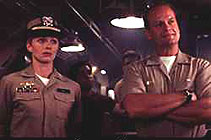|
|
|
|
Down
Periscope
|
 |
|
Here is a curious phenomenon. The American studio heads who dictate the latest movie cycles decided in the mid '90s that what we all want and need is a hearty military comedy. The cycle began with Operation Dumbo Drop (1995) and proceeded through Sgt. Bilko (1996) and a host of others, including various remakes of '60s TV shows. These films have nothing – or as little as possible – to do with war, death, politics and national conflict. They are usually about training, or sometimes just hanging out in uniform. It is all a bit like M*A*S*H* (the film or the television series), without those all-important noises-off, those sudden and disconcerting reminders of real human suffering elsewhere. Down Periscope, the latest lame effort in this cycle, does not ask for a political critique. It unfussily downsizes the narrative situation – war game manoeuvres involving nuclear submarines – to the level of genial, sitcom farce. Tom (Kelsey Grammer) is a maverick lieutenant put in charge of a run-down submarine by a hostile navy bureaucrat (Bruce Dern). Naturally, he is handed a motley crew of sailors: rebels, flakes, loonies, neurotics and even (horror of horrors) a woman. Tom galvanises the lot by stressing the pirate spirit of their military adventures. Ever since the Police Academy movies of the '80s, there has been a disconcerting duality in American comedies of this ilk. On the one hand, Down Periscope stresses a certain anti-establishment energy, roping in colourful, recognisably left-wing character-actors such as Rip Torn. On the other hand, the film is depressingly conventional in every one of its ultimate messages. Bizarrely, Down Periscope seems more like a radio play than a film. Nothing is made of the physical, claustrophobic setting of the submarine beyond the fact that it jams a bunch of characters together in every shot. And virtually all the laughs in the film come from gags involving sound rather than image: vocal mimicry, noises as clever ruses, singing, farting. Unquestionably the oddest aspect of the project is the part devised for Kelsey Grammer. His title role as TV's Frasier provides a vessel for the actor's fey, urbane, bumbling characteristics. This film, while remaining a comedy, tries to turn Grammer into a charming, handsome, almost macho hero of the people – "part Cary Grant and part Jack Lemmon", according to the producers. This effort to heroise Grammer is as strained and uncomfortable as the similar attempt to beef up Richard Dreyfuss' screen image in the Stakeout movies. Only during the final credits is Grammer allowed to finally let his hair down – camping it up with The Village People for a video clip rendition of "In the Navy". © Adrian Martin May 1996 |
![]()